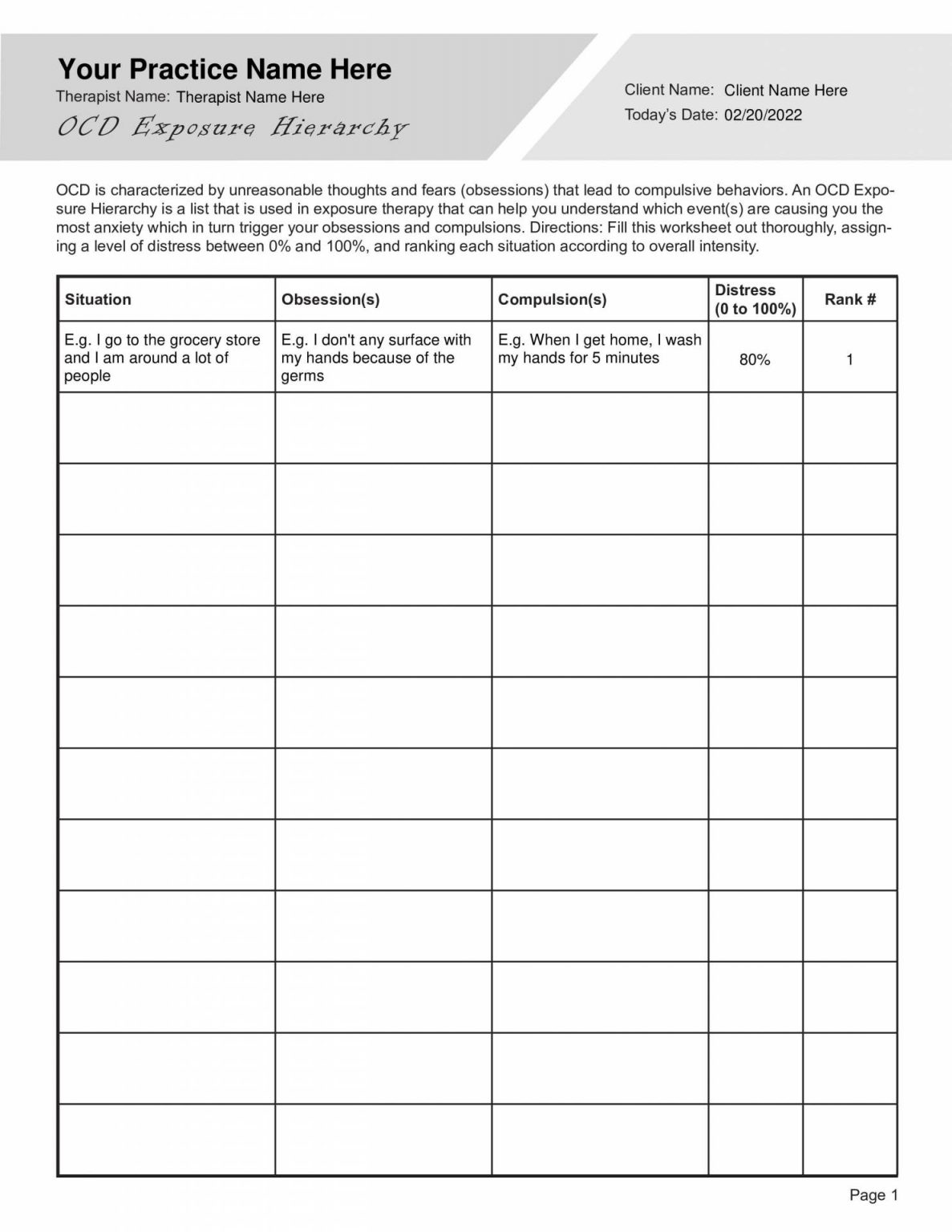Mastering OCD: Effective Exposure and Response Prevention Worksheet

Obsessive-Compulsive Disorder (OCD) is a mental health condition characterized by obsessive thoughts and compulsive behaviors. It affects millions of people around the globe, often leaving them feeling trapped in a cycle of distress and repetitive actions. One of the most effective treatments for OCD is Exposure and Response Prevention (ERP), which is a type of Cognitive Behavioral Therapy (CBT). In this comprehensive guide, we'll delve into how you can master OCD using an ERP worksheet, exploring every facet from understanding the technique to practical steps for implementation.
Theoretical Background of Exposure and Response Prevention (ERP)

ERP is grounded in the principles of behavioral therapy, aiming to break the cycle of OCD:
- Exposure: Facing your fears or obsessive thoughts intentionally.
- Response Prevention: Choosing not to engage in the compulsion that would typically follow the exposure.
By repeatedly confronting the feared situation, thoughts, or triggers, while preventing the habitual response, individuals with OCD can learn to manage their anxiety without resorting to compulsions. This method works by:
- Habituation: Gradually reducing the intensity of emotional reactions to the stimuli.
- Extinction: Diminishing the belief that compulsions are necessary to alleviate distress.
Creating an ERP Worksheet

Using an ERP worksheet can be an invaluable tool for both individuals and therapists to structure the ERP process:
1. Identify Obsessions and Compulsions

Start by listing specific obsessive thoughts and the corresponding compulsions:
| Obsession | Compulsion |
|---|---|
| Fear of contamination | Excessive hand washing |
| Uncertainty about safety | Repeatedly checking doors or locks |

📝 Note: Be as detailed as possible in your worksheet to capture the nuances of your OCD symptoms.
2. Exposure Hierarchy

Construct a hierarchy of fears or triggers from least to most anxiety-provoking:
| Level | Trigger | Anxiety Level (0-10) |
|---|---|---|
| 1 | Imagining touching something dirty | 2 |
| 2 | Touching a public surface | 4 |
| 3 | Using a restroom without washing hands | 6 |
3. Setting ERP Goals

Each exposure should have a clear goal, which could be:
- Enduring the exposure without engaging in the compulsion.
- Reducing the frequency or duration of the compulsion.
- Learning to tolerate uncertainty or anxiety without needing to act.
4. ERP Session Planning

Plan the exposure exercises:
- Time and Setting: When and where will the exposure occur?
- Duration: How long will you engage in the exposure?
- Response Prevention: How will you resist the urge to perform compulsions?
5. Record and Review

After each session, note:
- The intensity of anxiety experienced.
- Success in preventing the compulsive response.
- Thoughts and feelings during the exposure.
- Any progress or setbacks.
Implementing ERP in Everyday Life

Practicing ERP Regularly

Consistency is key in ERP:
- Schedule regular ERP sessions.
- Gradually work through your hierarchy.
- Keep detailed records to track progress.
Handling Setbacks

When faced with setbacks:
- Review your ERP worksheet to identify areas for improvement.
- Seek support from a therapist or support group.
- Be patient with yourself; progress is not always linear.
Integrating Mindfulness and Other Therapies

Complement ERP with mindfulness:
- Practice mindfulness to stay grounded during exposure.
- Use breathing exercises to manage anxiety.
- Consider integrating techniques from Acceptance and Commitment Therapy (ACT) to accept rather than fight against OCD symptoms.
🧘♂️ Note: Mindfulness can enhance ERP by teaching you to observe your thoughts and feelings without judgment.
In mastering OCD with an ERP worksheet, the journey involves understanding your triggers, methodically confronting them, and learning to manage your reactions. By engaging in ERP, you're actively working towards diminishing the power OCD has over your life. As you become more adept at handling anxiety without compulsions, you'll find increased freedom and control over your thoughts and actions.
What if I can’t stop my compulsions during exposure?

+
It’s normal to struggle initially. ERP is a skill that takes practice. If you find yourself unable to stop a compulsion, review your progress, adjust the exposure if necessary, and try again. Consider working with a therapist for personalized support.
Can ERP make OCD worse?

+
Temporarily, yes, as you face your fears directly, anxiety might increase initially. However, ERP is designed to reduce OCD symptoms in the long term. Patience and persistence are key.
How long does it take for ERP to show results?

+
The timeframe varies for each individual. Some see improvements in weeks, while others might take months. Regular practice and commitment to the therapy process significantly influence the outcome.
Is ERP the only treatment for OCD?
+
ERP is highly effective, but it’s not the only option. Medications, other forms of CBT, mindfulness practices, and lifestyle changes can also be part of a comprehensive treatment plan for OCD.